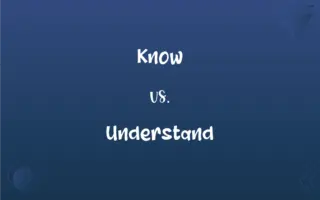Intelligent vs. Clever: What's the Difference?
Edited by Harlon Moss || By Aimie Carlson || Published on December 17, 2023
Intelligent refers to the ability to understand complex concepts and solve problems, while clever implies quick thinking and resourcefulness in practical matters.

Key Differences
Intelligence is a measure of one's cognitive abilities, encompassing analytical thinking, problem-solving, and understanding complex ideas. Cleverness, on the other hand, is more about wit and ingenuity in specific situations. While intelligence denotes depth and breadth of understanding, cleverness is about sharpness in applying knowledge or skills in a practical context.
An intelligent person often possesses a deep and well-rounded knowledge base, able to draw on various fields of learning. A clever person might not have the same depth of knowledge but excels in using what they know in creative or unexpected ways. Intelligence is more about what one knows, and cleverness is about how effectively one uses that knowledge.
Intelligence is often associated with academic and theoretical contexts, reflecting a person's ability to grasp complex theories and principles. Cleverness is seen more in everyday problem-solving, showing resourcefulness and adaptability in various situations. While intelligence is about understanding, cleverness is about practical application.
In terms of development, intelligence can be nurtured through education and continuous learning. Cleverness, however, is often seen as a natural skill, involving quick thinking and adaptability. Intelligence is a broader concept, while cleverness is more focused on immediate problem-solving and practical intelligence.
Comparison Chart
Primary Focus
Deep understanding and problem-solving
Quick thinking and practical solutions
ADVERTISEMENT
Context
Academic, theoretical
Practical, real-world
Associated Traits
Analytical, knowledgeable
Ingenious, resourceful
Development
Through education and learning
Often innate, honed through experience
Perception
Seen as scholarly or academic
Viewed as witty or sharp
Intelligent and Clever Definitions
Intelligent
Showing good judgement and reasoning.
Her intelligent decision saved the company from bankruptcy.
ADVERTISEMENT
Clever
Showing quickness of mind in understanding.
He was clever enough to solve the puzzle in seconds.
Intelligent
Capable of understanding and solving complex problems.
The intelligent student quickly mastered advanced calculus.
Clever
Skilled at doing or achieving something; resourceful.
Her clever use of leftovers created a delicious new dish.
Intelligent
Having a high level of knowledge and understanding.
An intelligent conversation about quantum physics ensued.
Clever
Apt at trickery or deception.
She devised a clever plan to escape unnoticed.
Intelligent
Able to learn and adapt quickly.
His intelligent response to new challenges made him an asset to the team.
Clever
Characterized by originality and imagination.
A clever invention that changed the industry.
Intelligent
Possessing a deep insight.
Her intelligent analysis of the novel revealed hidden themes.
Clever
Witty or humorous.
His clever remark lightened the mood.
Intelligent
Having intelligence
Is there intelligent life elsewhere in the galaxy?.
Clever
Mentally quick and original; bright
A clever student.
Intelligent
Having a high degree of intelligence; mentally acute
An intelligent student.
Clever
Skilled at accomplishing things, especially with the hands
A clever carpenter.
FAQs
Is intelligence the same as having a high IQ?
No, intelligence is broader than just IQ, encompassing problem-solving, reasoning, and understanding.
Are intelligent people always good at academics?
While intelligence often helps in academic achievement, it's not a guarantee of academic success.
Is intelligence fixed from birth?
Intelligence can develop and change over time through learning and experiences.
Do tests accurately measure intelligence?
Tests can measure certain aspects of intelligence but may not capture its full breadth.
Is intelligence a predictor of success?
Intelligence can contribute to success but is not the sole determinant.
Can intelligence change over a lifetime?
Yes, intelligence can develop and evolve throughout a person's life.
Can clever people lack common sense?
Yes, someone can be clever in specific areas while lacking practical common sense.
Can cleverness be learned?
Cleverness, being more about quick thinking and resourcefulness, can be honed but is often innate.
Is cleverness just about being smart?
Cleverness is not just about being smart; it's about applying intelligence in a practical, often ingenious way.
Does being clever mean one is also intelligent?
Not necessarily; one can be clever in practical matters without being highly intelligent in academic terms.
Can someone be intelligent but not clever?
Yes, a person may have deep theoretical knowledge (intelligent) but may struggle with practical application (clever).
Is cleverness valued in the workplace?
Yes, cleverness, especially in solving problems quickly and creatively, is highly valued.
Is cleverness linked to creativity?
Cleverness often involves creativity, especially in finding unique solutions.
Does being clever guarantee success in problem-solving?
Cleverness can aid in problem-solving, but it doesn't guarantee success, which often depends on various factors.
Do intelligent people always make rational decisions?
Not always; intelligent people, like anyone else, can be influenced by emotions or biases.
Is intelligence the same across cultures?
The concept of intelligence can vary across cultures, with different societies valuing different types of intelligence.
Are intelligent and clever mutually exclusive?
No, they are not mutually exclusive; a person can be both intelligent and clever, although they are distinct qualities.
Can a person be intelligent in one area but not in others?
Yes, intelligence can be domain-specific, with individuals excelling in certain areas while not in others.
Are there different types of intelligence?
Yes, there are multiple forms of intelligence, including emotional, spatial, and logical.
Can someone be too clever for their own good?
Yes, being overly clever can sometimes lead to overlooking simple solutions or underestimating risks.
About Author
Written by
Aimie CarlsonAimie Carlson, holding a master's degree in English literature, is a fervent English language enthusiast. She lends her writing talents to Difference Wiki, a prominent website that specializes in comparisons, offering readers insightful analyses that both captivate and inform.
Edited by
Harlon MossHarlon is a seasoned quality moderator and accomplished content writer for Difference Wiki. An alumnus of the prestigious University of California, he earned his degree in Computer Science. Leveraging his academic background, Harlon brings a meticulous and informed perspective to his work, ensuring content accuracy and excellence.








































































